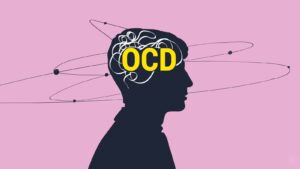Existential OCD is a condition that can be difficult to diagnose. It is characterized by excessive worry and fear about the meaning and purpose of life. If you are experiencing these symptoms, it is important to seek help from a professional. In this blog post, we will discuss what existential OCD is, and how you can go about getting diagnosed with it.
Contents
What Is Existential OCD?
 Existential OCD involves intrusive, repetitive thoughts and worries related to death, dying, nihilism, and the meaninglessness of life. Individuals with this type of OCD may fixate on their mortality or the idea that life is meaningless.
Existential OCD involves intrusive, repetitive thoughts and worries related to death, dying, nihilism, and the meaninglessness of life. Individuals with this type of OCD may fixate on their mortality or the idea that life is meaningless.
Existential OCD means having intrusive thoughts about life’s great questions. These can be questions like: “What is the meaning of life?”, “Why are we here?”, and “Is there a God?”. People with Existential OCD often feel like they need to find answers to these big questions to have peace of mind.
Many people with Existential OCD report feeling like they’ve “awakened” to the meaninglessness of life and now can’t see it. This can be a very distressing experience.
Can Existential OCD Diagnosis is Possible?
Existential OCD diagnosis is possible or not possible? This is a question that many people with Existential OCD ask themselves. The answer to this question is not as simple as a yes or no. It may be confused with depression.
A therapist will ask you questions about your thoughts, feelings, and behaviors. No test can diagnose Existential OCD. There are many factors that someone can be diagnosed with Existential OCD or not. A few are:
- The first factor is whether the person has any other mental disorders. If the person does not have any other mental disorders, then they might be able to get a diagnosis of Existential OCD. However, if the person has another mental disorder, such as depression or anxiety, then it might be more difficult to get a diagnosis of Existential OCD.
- The second factor is whether the person has any obsessions or compulsions that are related to their Existential OCD. If the person has obsessions or compulsions that are not related to their Existential OCD, then it might be more difficult to get a diagnosis.
- The third factor is whether the person can function in their everyday life. If the person is not able to function in their everyday life, then it might be more difficult to get a diagnosis of Existential OCD.
- The fourth factor is whether the person is willing to seek treatment for their Existential OCD. If the person is not willing to seek treatment, then it might be more difficult to get a diagnosis.
- The fifth factor is whether an individual has insurance that will cover the cost of treatment for Existential OCD. If the person does not have insurance, then it might be more difficult to get a diagnosis.
Getting a diagnosis of existential OCD can be very difficult as it can be misdiagnosed as general fear or anxiety. All of these factors go into whether or not someone can be diagnosed with this. If you think that you might have Existential OCD, then it is important to talk to a mental health professional about your symptoms and concerns.
How Existential OCD Diagnosed?

Existential OCD is diagnosed using the same criteria as other types of OCD. A person must have obsessions and compulsions that cause them significant distress and interfere with their daily life. For instance, a person with Existential OCD may avoid thinking about death or the meaning of life to reduce their anxiety. Or, they may compulsively research topics related to their obsessions in an attempt to find answers.
To diagnose Existential OCD, a mental health professional will ask about your symptoms and thoughts. They will also want to know if these thoughts are negatively impacting your life. It can be very difficult to diagnose existential OCD.
If you’re struggling with intrusive thoughts related to death, dying, or the meaninglessness of life, please reach out to a mental health professional for help. Existential OCD can be a very debilitating disorder, but there is hope. With treatment, you can learn to manage your symptoms and live a full and meaningful life.
What To Do After Diagnosis?
After you have received a diagnosis of existential OCD, it is important to seek professional help. It is usually treated with a combination of medication and therapy.
Exposure and Response Prevention
This type of therapy helps you face your fears head-on. You will work with a therapist to gradually approach the things that trigger your existential OCD.
Cognitive behavioral therapy
This type of therapy helps you change the way you think about your OCD. They must also not be able to control their thoughts or behaviors. For instance, someone with Existential OCD might obsessively research different religions in an attempt to find the “right” one, or they may compulsively avoid anything that could trigger their fear of death.
Support groups
There are many online and in-person support groups available for people with Existential OCD. These groups can provide you with support and understanding from others who are going through similar experiences.
Medication
Medicines can be used to treat existential OCD, including antidepressants, anti-anxiety medications, and antipsychotics. It is used to target the anxiety that is associated with Existential OCD. Your doctor will work with you to find the medication that is right for you.
Self Care
In addition to professional help, there are several things you can do on your own to manage your Existential OCD. They are: get enough sleep, eat a healthy diet, exercise avoid alcohol, and drugs.
Existential OCD can be a very difficult condition to live with, but there is help available. If you think you may have Existential OCD, reach out to a mental health professional for help. The goal of treatment is to help the individual manage their obsessions and compulsions and live a more normal life.
Conclusion
It may be concluded that a mental health professional can diagnose OCD through a clinical interview and self-report measures. The individual must present with obsessions and/or compulsions related to death, dying, or the meaning of life that cause significant distress and interfere with functioning.
If you are struggling with existential OCD, know that you are not alone. Many people suffer from this debilitating condition. There are treatment options available that can help you manage your symptoms and live a fulfilling life.
For further information and suggestions, please contact Therapy Mantra. We have a team of expert therapists that can help you overcome this problem. Get in touch with us right away to learn more about our services. You may also make an online therapy session or download our free Android or iOS app.


